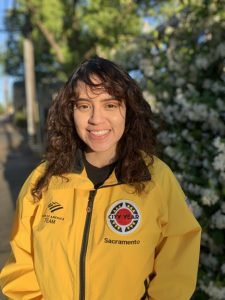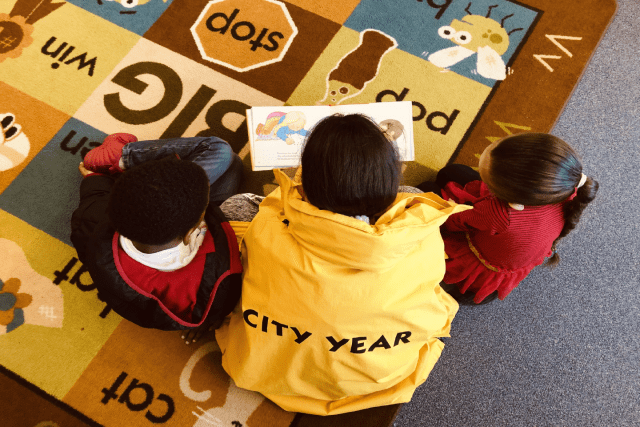Reflections from multiple years of service
Tips for a successful year of service
City Year service is a unique experience that allows young people from across the country to create more equitable learning environments by helping students to thrive in their school communities. It’s a year-long commitment that can be challenging yet worthwhile, and City Year AmeriCorps members often choose to extend their service an additional year. In fact, this year, 22 percent of City Year AmeriCorps members are second-year corps.
Vanessa Figueroa, a Fresno California native and AmeriCorps member currently serving with City Year Sacramento, is one of the exceptional examples of a corps member serving a third year.
Although initially interested in going to law school to pursue a career in education policy, Vanessa wanted first to gain experience in the classroom. In her senior year of college at the University of California, Davis, a City Year recruiter visited her campus to discuss the opportunity to serve the community as an AmeriCorps member. Vanessa was sold.
Vanessa began her service at Leataata Floyd Elementary on a team of seven AmeriCorps members in August 2018.Today, she’s looking back on her extended time as a City Year AmeriCorps member, which has been a rollercoaster experience, to say the least. Her service bifurcated by the COVID-19 pandemic, Vanessa knows what it’s like to provide both in-person and virtual support to students, giving her a unique perspective.
As Vanessa’s final year of service with City Year comes to a close, she shares her reflections on her one-of-a-kind experience and why AmeriCorps members play an integral part in creating nurturing school communities for all students.
Service can be tough. Give yourself – and your students – some grace
” As a third-third year AmeriCorps member serving for the past year in a virtual classroom, I know that service can be hard, and I try to support my other teammates through their first-year experience,” Vanessa says.
“Since I’ve experienced service outside of the virtual space and know some of their students from having worked with them in person previously, I try to support my team that way. If a student isn’t opening up, I try to tell them, ‘Don’t worry, they just need space or more time,’ or ‘I know it’s easier said than done but don’t take it personally. That student was just having a bad day.’
This is such a challenging time to be doing service. Like our students, most of us are cooped up in our houses all day, with little social interaction. In terms of our work, it’s hard to feel like you’re building meaningful relationships through a screen—it’s easy to have low morale. And when your student is also having a bad day, it compounds that feeling. But instead of beating myself up or blaming the student, I’ve learned that it’s a lot better to extend grace.
So, however future corps members are serving next year, in-person or in the virtual classroom, be kind and patient with yourself. It’s hard to remember this on the most challenging days, but you are having an impact. You may not see it or feel it now, but you are someone’s inspiration and support—so, keep going. It’s worth it.”

Language helps build and sustain meaningful relationships
“Spanish is my native language, and it was also my major at UC Davis. So, it is a significant part of my identity. And with 26% percent of our student population here in Sacramento identifying as Hispanic or Latinx, the Spanish language has been an essential part of the way I build relationships with many of our students.
In American schools, speaking and instruction in a language other than English are generally not supported. I know that from personal experience and from my time in the classroom. It’s something that I struggled with—seeing how this system was built for assimilation and the flattening of identities. The messages we receive from society about speaking Spanish are hardly encouraging. It can lead to students feeling insecure or like they can’t show up to school as their whole selves.
In response to that, I started a Spanish Club. It’s an afterschool space where students are encouraged to speak and celebrate the Spanish language. Most students who attend speak Spanish as their first language, but it is open to anyone who wants to learn. I try to format the club in a way that doesn’t lean on formal academic instruction. I want students to see that practicing or learning a language can be creative, interactive and, most importantly fun! We watch movies and tv shows, or we might have a “hot topic” for discussion. It’s really meant to be relaxed and free-flowing.
The Spanish Club has been a way for me to create a safe space and identity-affirming space for myself and my students.”
Find joy and purpose in your work
“After returning for my second and third year of service, I’ve realized that I have a passion for nonprofit, grassroots work and for giving back to my community, to my students. They have filled my three years with so much joy and mutual admiration. Just as I know some of them look up to me, I also look up to them. They’ll call me out if I’m having an off day, they’ll try to cheer me up if I’m in a bad mood, and I’m impressed by the way they continue to show up through their own challenges.
Through it all, the relationships I’ve built with my students are what keeps me going.
City Year can serve as a pathway to a career in teaching, education policy—or both!
“Going into my first year of service, I thought, ‘I’ll do this for a year, gain practical experience and then apply to law school.'” I wanted to pursue a career in education policy. But with each year, I found that I wanted more of that in-class experience. So, after this year, I hope to get a teaching job somewhere in the Sacramento area.
My years as a corps member have been so informative—and transformative—but I know that this is experience is not the same as leading a classroom as a teacher. Long-term, I still want to go to law school. I want to be involved in education policy, but I wouldn’t feel confident doing that without having teaching experience.
City Year taught me how “on-the-ground” work could have a tremendous impact, and I see teaching as an extension of that. By teaching, I’m hoping to have a positive effect on even more students and communities. I’m also dedicated to learning more about the systemic inequities students face in and out of the education space. The classroom is not on an island, separated from the rest of the community—it is a part of it. So, if there are challenges in the community, there are challenges in the school.
I’m looking forward to learning and carrying these lessons with me after City Year and for the rest of my career.”
Want to be a part of a nurturing, supportive community for students? Apply to serve now!
Related stories
Over the last few months, City Year Memphis and their local Starbucks partners—along with several other community organizations, businesses and...
Read more about Creating hope and opportunity in Memphis through partnershipsIn recognition of Financial Literacy Month, City Year AmeriCorps members are exploring the importance of financial literacy for young people’s...
Read more about Understanding the importance of equitable access to financial literacyIf you speak with an HBCU alum about their experience, you’ll quickly learn that service to the community is one...
Read more about Diversity, leadership and community: reflections of an HBCU alumDo you know about the vibrant city of Kansas City and the incredible opportunities it offers to City Year AmeriCorps...
Read more about Seven reasons to serve with City Year Kansas City















